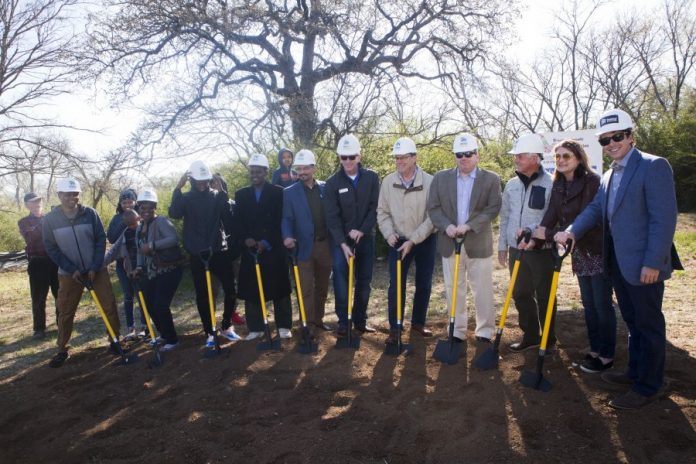
In a world where diversity is being questioned and people of different beliefs have trouble getting along, seven very different southern Denton County faith-based institutions have found a way to understand each other better by helping others.
After a year of planning, the Habitat for Humanity of Denton County Interfaith Coalition broke ground March 20 to build a home in Denton. The initiative is the second for the coalition and part of Habitat for Humanity of Denton Country’s mission to raise money and build homes for low-income families to purchase.
Congregations involved are Creekwood Christian Church, Trietsch Memorial United Methodist Church, Flower Mound United Methodist, Congregation Kol Ami, the Islamic Association of Flower Mound and Lewisville, Flower Mound Presbyterian, and the Bahá’í of Flower Mound.
Habitat for Humanity of Denton County started in 1994 and recently built its 100th home. The first interfaith build was in 2013 and involved Creekwood, Kol Ami and the Islamic Association of Flower Mound and Lewisville, with the other four coming aboard last year in an effort that has thoroughly impressed John Montoya, executive director since late last year.
“Coming in here, one of the most inspiring things is seven faith-based organizations and different faiths coming together to build a home for one family,” Montoya said. “When I think of that kind of unity and service from such a diverse group it is inspiring and motivating for me. It was beyond cool. I don’t know about these kind of joint efforts elsewhere.
“It’s common ground to build a house figuratively and literally. Most of the volunteers are from the congregations. Even the different food needs are planned-out, with each congregation having its own food coordinator.
“And they actually like each other, which is cool at a time of such division. This is inspiring that we are doing this in Denton County. Others would envy us if they knew about it.”
“Once other churches hear about it, we hope they will get involved,” added KeriMarie Sutherland, Habitat of Humanity of Denton County’s development program manager. “It’s all in the spirit of service and love.”
The specially-modified 1,300-square-foot home is being built for the Tarmo family, which moved to the United States from Tanzania. The family features parents Benedict and Mary and children Joseph, 18, Gregory, 18, Graceana, 16, Gilbert, 10, and Geoffrey, 5.
Like other families in the program, the Tarmo’s mortgage will be without interest.
“We save them about 50-percent or more a month on their payment,” Montoya said. “It helps them build equity, as every dollar goes to paying the principal. Most families pay it off in an average of 15-20 years.
“We monitor the relationship with the family for 30 years, because we are the mortgage holders. It’s a long-term relationship with the families. We call them partners, rather than clients.”
Using a combination of local contractors and volunteers from the congregations, the goal is to have the Tarmo’s in their home by early summer.
“Committed volunteers do most of the work from the planning stage to the building stage,” Montoya said. “We hire for tasks that are either difficult or nearly impossible for us to do (like foundation, electrical and plumbing).”
Leading the project has been Brian Strohl, a Habitat board member and member at Flower Mound United Methodist. A civil engineer with an extensive background in construction, he has helped coordinate the project from leading the monthly meetings to organizing fundraising for the $75,000 project, securing in-kind material donors, coordinating volunteer work schedules and food arrangements, and educational sessions at each location.
“We are all coming together and sharing the same values, even though it comes from different things,” Strohl said. “The thing that was exciting about talking to some of the original folks that did the one [house] four years ago they jumped up right away and said: ‘we loved that one. It was life-changing. I made so many friends. It was a great experience, beyond just the build being able to make friendships across your normal bounds.’”
When talking with each other, the congregations realized that charity and how it ties back to their faith was the common ground. So, each went back to their members to raise the money needed.
“That was the easy sell as others said: ‘huh, I want that, too,’” Strohl said. “That was a really neat thing to build off that.”

















